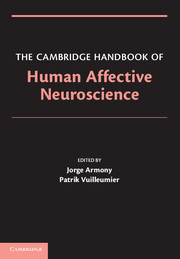Book contents
- The Cambridge Handbook of Human Affective Neuroscience
- The Cambridge Handbook of Human Affective Neuroscience
- Copyright page
- Dedication
- Contents
- List of Contributors
- Introduction
- Section I Introduction to Human Affective Neuroscience
- Section II Measuring Emotional Responses
- Section III Emotion Perception and Elicitation
- Section IV Cognitive-Emotion Interactions
- Section V Emotional Learning and Memory
- Section VI Social Emotions
- Section VII Individual Differences in Emotion
- Chapter 24 TraitAnxiety, Neuroticism, and the Brain Basis of Vulnerability to Affective Disorder
- Chapter 25 Mapping Neurogenetic Mechanisms of Individual Differences in Affect
- Chapter 26 Sex Differences in Emotion
- Chapter 27 Development of Affective Circuitry
- Chapter 28 Emotion and Aging
- Index
Chapter 24 - TraitAnxiety, Neuroticism, and the Brain Basis of Vulnerability to Affective Disorder
from Section VII - Individual Differences in Emotion
Published online by Cambridge University Press: 05 February 2013
- The Cambridge Handbook of Human Affective Neuroscience
- The Cambridge Handbook of Human Affective Neuroscience
- Copyright page
- Dedication
- Contents
- List of Contributors
- Introduction
- Section I Introduction to Human Affective Neuroscience
- Section II Measuring Emotional Responses
- Section III Emotion Perception and Elicitation
- Section IV Cognitive-Emotion Interactions
- Section V Emotional Learning and Memory
- Section VI Social Emotions
- Section VII Individual Differences in Emotion
- Chapter 24 TraitAnxiety, Neuroticism, and the Brain Basis of Vulnerability to Affective Disorder
- Chapter 25 Mapping Neurogenetic Mechanisms of Individual Differences in Affect
- Chapter 26 Sex Differences in Emotion
- Chapter 27 Development of Affective Circuitry
- Chapter 28 Emotion and Aging
- Index
Summary
Keywords
- Type
- Chapter
- Information
- The Cambridge Handbook of Human Affective Neuroscience , pp. 553 - 574Publisher: Cambridge University PressPrint publication year: 2013
- 19
- Cited by

